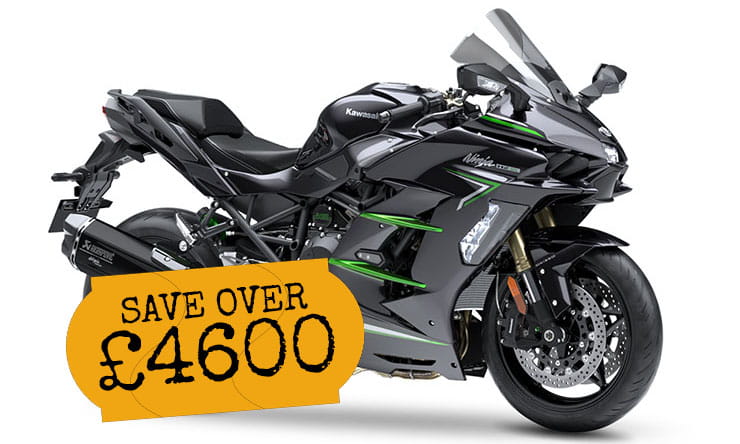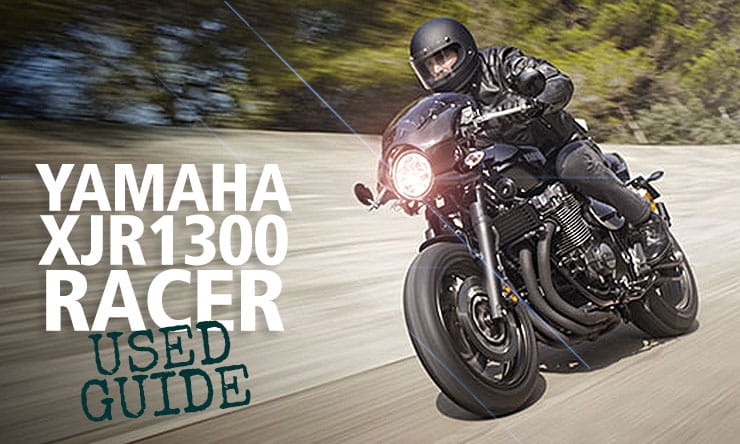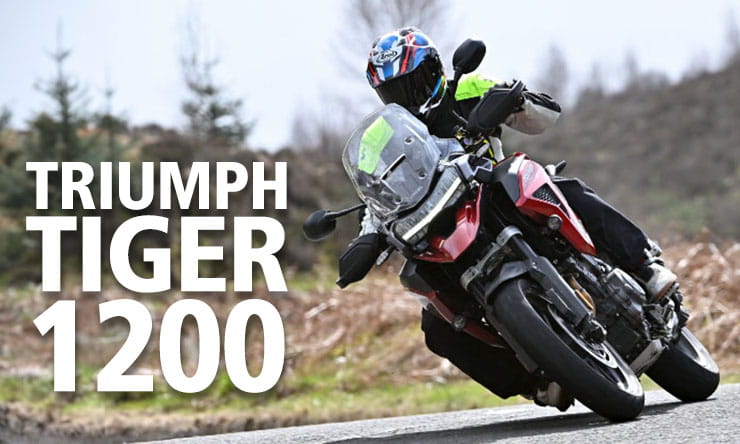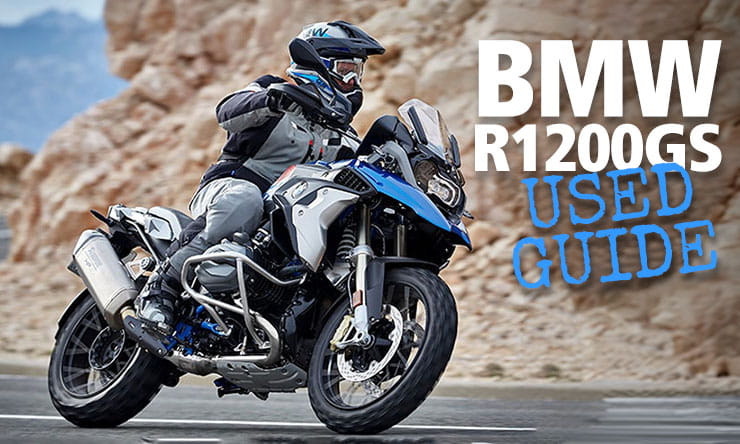Fabrizio Cazzoli is a sprightly 52-year-old, born and raised in the hills around Bologna but within a short hop of the Ducati factory. He was into bikes from an early age because, with no public transport out in the countryside, it was the only way to get around without nagging the parents or having to pedal. A Malaguti scooter came first, then a 125, and then onwards until Fabrizio started working for Ducati in 1997; a job which came with an ST2.
Moving up through the company, in 2017 Fabrizio moved east to oversee the creation of Ducati China as an independent subsidiary, which had until then operated under the Audi umbrella – and from 2018 he also oversaw Ducati Japan.
At Christmas last year Fabrizio moved halfway around the world to become the managing director of Ducati UK, replacing Tim Maccabee who’d held the position since 2005.
Fact file
Name: Fabrizio Cazzoli
Age: 52
Job title: Managing Director, Ducati UK (including Ireland, Norway and Sweden)
Favourite Ducatis: Multistrada V4S, Panigale V2 and the new DesertX
So Fabrizio, how did you end up in the UK?
“The job I do, which is basically manage company subsidiaries around the world, involves rotation from time to time. So, there has been a rotation of company managers; Tim decided to leave the company, so who can cover the position? I’d been in China for almost five years, and the company decided to send me here to take over.”
Do you have a UK connection?
“Yes, my wife is British – so that’s helped a little bit.”
And how is the UK compared to China for Ducati?
“It’s very different to my previous job. China is a much bigger market than the UK – think of the size of country. But the volume of sales of any manufacturer in relation to the size of the population is basically insignificant.
“There are some big differences between the UK and China. China is an expanding market and the motorcycle world isn’t so mature; everything is new. Over here, everything is consolidated – the skills of the dealers, the skills of our customers, the age of our customers, the challenges we are facing – all very different.”
[Ducati had a good year in 2021 – after global sales dropped by 9.7% in 2020 compared to 2019, no doubt related to the pandemic, last year they bounced back to record highs. The factory sold 59,447 bikes worldwide, up 24%. Their biggest market is the US (9007 bikes) followed by Italy (8707), Germany (6107) and then China (4901) eclipsing both France (4352) and the UK (2941). The best-selling model is the Multistrada V4, followed by the Scrambler 800 family and the new Monster.]
The traditional view is working in an expanding market is exciting because you invest money creatively to see revenue growth; in a mature market, you make money by cutting costs – which, let’s face it, sounds a lot less fun.
“You are not the first person to tell me this! Both jobs have challenges, they are just different. So, I’m not regretting anything – and I believe the UK has a lot of potential for Ducati. We are lucky because right now I genuinely believe Ducati, as a brand, is in a fantastic position with an incredible product range. So, my job is to fulfil this potential.”
I’ve ridden almost every Ducati model made since 1992, and it seems to me Ducati have undergone a quiet revolution in the last decade, going from bikes that were, frankly, not for everyone – too hard to ride, you have to ride the way Ducati want you to – to being much more user-friendly and accessible to anyone. But while we understand the revolutions over the same timeframe at BMW and, to an extent, Triumph, the Ducati story is less well-communicated.
“I see it from the inside. I don’t see a revolution; I see a fulfilled strategic business plan that has been well designed and executed. So, we say we want to be an iconic brand, and that’s the line we follow. For us to say, ‘This is where we want to be in the future...’ it’s not a big surprise when we get there. Clearly, we are not stepping back from our DNA, we are not changing our direction. So, when we enter into a new segment, we do it with the same logic and same strategy.” [as with the forthcoming DesertX adventure bike; Ducati’s first with a 21in front wheel, using a variant of the familiar 937cc twin from Multi V2, Monster, SuperSport etc].
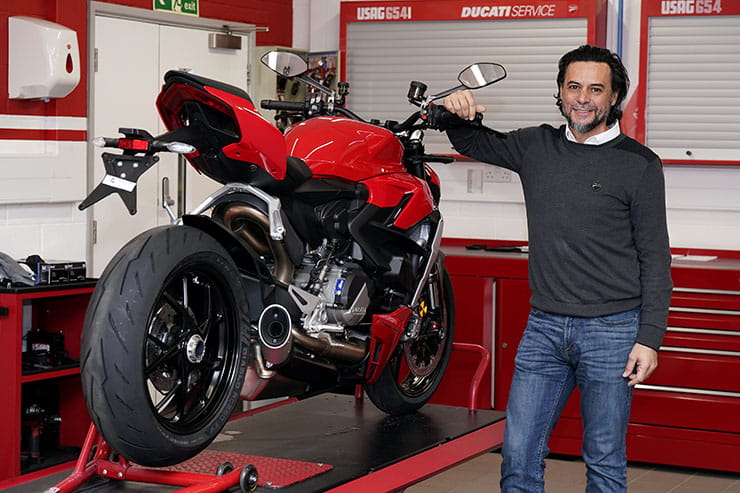
Do you personally have a Ducati to ride in the UK?
“When I was in Japan, I had a 1098, but I haven’t had time here yet – and I’m waiting for the weather to get better. And every time I’ve crashed it’s been in the wet, so it’s not my favourite condition! My favourite Ducati at the moment is always a difficult question but I think the Multistrada V4 is the right combination now for a person like me. But I have – late, very late! – started to go on track as well; it’s a new thing for me because I’m usually a road rider so I’m kind of between the Multistrada and a Panigale V2. These are my two bikes. But I’m lucky because Ducati have such a wide range of bikes and they’re very versatile – you can easily change from one to the other.”
That’s exactly the revolution I was asking you about… because that’s not what Ducati’s were like in the 1990s!
“Well, there is some truth. The way I would put it is that first of all, the DNA is the same. But with product development, it’s the normal thing to do. Make the bike easier to ride, less tiring, more in control – but the core is the same. That’s the way I like to think of it. And the world is changing, performance is changing, the needs of the customer are different.
“And the direction for the future is still unclear – but what isn’t unclear is that it’s going to change.”
You said the Multistrada is your perfect Ducati...
“Yes, but before this one came! [laughs and gestures behind him to a huge image of the new DesertX roostering off a sand dune]. Now I really hmm... yes.”
How is your off-road riding?
“Off-road is where I started, really – on field bikes, so don’t expect me to be jumping off sand dunes. The third jump I did on my 125 back in the time was a really, really bad one! But I like off-road – the sense of adventure, of discovering new places. The best ride I did in China – not off-road, but kind of adventure – was up to Inner Mongolia, beautiful places to go.”
So, what exactly is the role of Ducati UK? What do you do?
“We are a commercial subsidiary of Ducati – that means we import the bikes and deliver to our dealer, who then sell them to customers. This is the practical part – administration, compliance, a lot of paperwork. But then the added value part is brand promotion and the development of our dealer network. The bikes’ specification comes from headquarters, so my job is to work out what customers want in the UK and how that might be different to what is required in Europe. If you want, this is part of the silent revolution you mentioned: understanding what the customer demands; being closer to the customer in terms of product specification but also customer satisfaction. An excellent product, but also an excellent service.
“So the role of Ducati UK is to be an answer to the business of our dealers, because if our dealers are successful, we are successful – it doesn’t work the other way round. But the dealer is only successful if they provide a good product and good service to the customer.”
How healthy is the dealer network? There are 30 dealers in the UK? Doesn’t sound that many to me...
“We are at 31 dealers at the moment. But we are not a mass product – the improvement is not in the number of dealers but the quality of the dealers. They are better than they were two years ago and they will be better in the future – and they will increase in number, but not dramatically. I personally hate the internal competition, so we will never put a dealer next door to another one. That doesn’t work.”
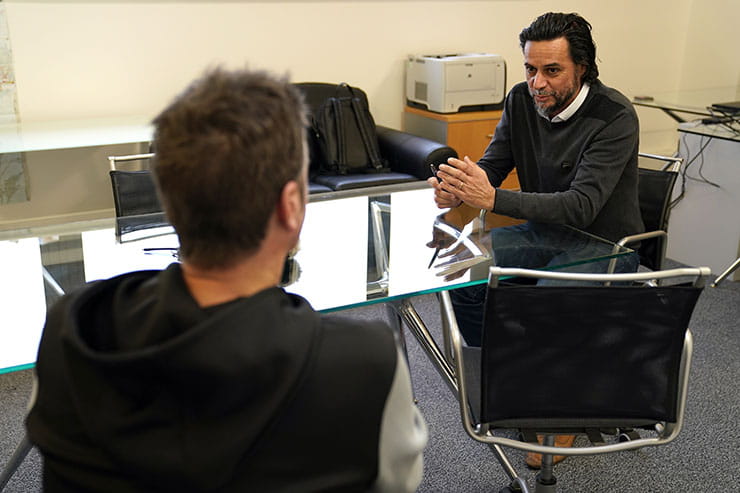
How different is the UK to the rest of Europe?
“I don’t believe there are specific differences in terms of business management. But what we are looking at in the UK is the difficulty in getting a licence, which is putting off some younger riders. It makes the UK market older, much more than southern Europe where have many more younger people ‘joining the gang,’ let’s say. That’s the bad news. The good news is that I believe the standards and skills of the people in the motorcycle business – such as dealers – is significantly higher than in other places.”
In terms of motorcyclists in general, is there anything specific about the UK market? Back in the 1990s, where I live...
“Me too!”
... it was traditionally ‘sportsbike UK’.
“It’s changing now. But what the UK has to say and its opinions in the sports world still counts for a lot with Ducati. I would say the sport reputation is still really strong. Maybe what is happening is there is a shift towards sportsbikes on track – we’ve just opened subscription for our own track days, and places have gone so fast. We don’t have enough days or events to provide for the demand. So sports UK is still very, very strong. The success of British Superbike is a good example. And World Superbike is still popular in the UK.
“But it’s like a religion – I feel it’s held more in the church these days; the church of the circuit. But in terms of bike sales, the Multistrada is the best seller; the V4 and the V2. Is it because we have a very good product, or because the market is more receptive to this kind of bike? I think it’s a bit of both. It doesn’t mean we have to be in every segment in every displacement because we don’t do that. But when we do it, we have to be the best.”
There are still some obvious gaps in Ducati’s model range: you don’t make any modern classics.
“We used to, with the Sport Classics.”
But Ducati haven’t played on their history much as some other manufacturers.
“The Scrambler covered one part of the segment – but yes, we aren’t in every segment we could be and maybe we will be in the future. But right now the bikes we have are more than enough for what we believe is out market potential. But I’m not saying the in the future there won’t be products in that direction.”
Heritage-based models?
“Maybe heritage, maybe classic – which is not the same thing. We are looking at how the market is developing and if there is an important opportunity, we will be there.”
Let’s talk about the future. Petrol engines will be phased out over the next 15 years, and so any new conventional internal combustion engine being developed now will probably be the last. Expand on Ducati’s involvement in the MotoE project in 2023 with the... has the bike got a name yet?
“No, the bike has no name yet, because commercially there is no bike yet. But for Ducati to be the sole provider for the championship is a very, very important step. Huge. The bike looks fantastic and is performing incredibly well – that is important because maybe in the future if there is interest in that segment then we will be there. But right now – honestly – there is no market. If you look around, a performance motorcycle with a decent range and weight is not here. But it’s important for Ducati to be involved.”
We don’t know what the future will be – electric, hydrogen, synthetic fuel – but we do know a petrol engine isn’t it. That uncertainty must be difficult to plan for, as a manufacturer.
“I personally believe Ducati are in a strong place because we are part of the Audi group and the resources being dedicated to alternatives is huge. We are looking at several potential developments; electric is one, but not yet for commercial purposes. Hybrid is another. Hydrogen is another option, further down the line but it would make no sense to ignore it. But personally, I do not believe the internal combustion engine will be ruled out completely: I expect in the medium term it will have advantages the others can’t match. So we are looking at all of them. There is no one answer yet. Not in cars or motorcycles. If the question is ‘what are the manufacturers doing about it?’, the answer is putting their ears up, opening their eyes, looking around at what the market is thinking and doing.”
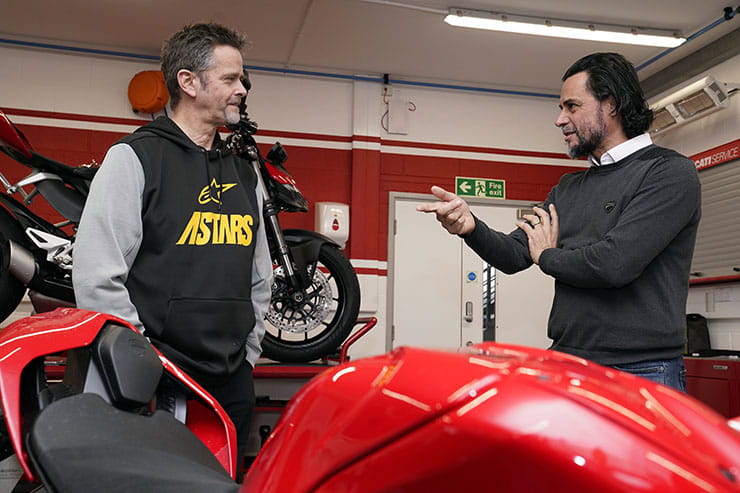
What keeps you awake at night?
“Nothing! Not in the business of motorcycles! But I understand your point – I think what we’ve just been talking about is the big thing for everyone at the moment, and no-one has the answer. But also the barriers to getting into motorcycling – no-one has the answer to this, either. Maybe we lower the demands of the test, or maybe make it cost less, is it choking the market? – and one area I think we should be working harder to be more communicative – is more motorcycles, less traffic. I’m talking about where you have one car, you can have four bikes. You can demonstrate that more motorcycles mean less traffic and less congestion. It’s immediate. Electric has nothing to do with it – electric cars take up as much space as petrol cars. This is something we need to work on.”
But you need more motorcyclists for that – you have to persuade people out of cars and onto bikes.
“I wouldn’t say take them away from cars – give them the choice.”
How much responsibility should manufacturers bear to getting more people into motorcycling? Once upon a time, the manufacturers were passive; they just sold motorbikes.
“I think it’s very much on the shoulders of the manufacturer, not only to make the right products, but also to have the right relationship with politicians. At this point there is no motorcycling in their manifestos. Why? Because no-one is talking to them about it. So we need to increase our presence and to state our position at international, national and local levels. We have to talk about it and be listened to. So how? The reduction of traffic, and show the impact of emissions from motorcycles is irrelevant. The more motorcycles you have, the lower your emissions. The more motorcycles, the less traffic you have. I don’t see that talked about in a complex way.”
Let’s change direction and talk about racing – there was a recent announcement that Michael Dunlop will be racing a Paul Bird Motorsport Ducati Panigale V4 R at the TT this year.
“The road is not an official Ducati Corse place. I know they will be riding a Ducati, but it’s not the factory world for Ducati. Ducati Corse is Ducati Corse and Ducati UK is Ducati UK! Their presence is managed by them, of course.”
Have you been to the TT?
“No, I haven’t.”
Are you going this year?
“I would hope, but there are so many places I have to go to – we have so many overlapping events.”
What are you looking forward to doing in the UK this year?
“I want to ride. Where I came from in China and Japan, it’s very hard to just jump on a bike and ride, just go. If you do that in China, within an hour you’ll be stopped by the police and fined for something. I couldn’t even ride my bike from home to the office. There are a lot of limitations. You cannot go on the motorway, you cannot go in the city centre. In Japan, you can’t enter a tunnel on a motorbike, you can’t go under some bridges, you cannot ride with a passenger on the highway. I remember once I was thinking where to go with my wife on the back, I entered the highway and she tapped me on the shoulder and started to speak and I said shhh, I’m thinking about where to go. As soon as we got to the toll barrier, I looked like a terrorist – alarms, lights on, trapped between the barriers. Because it’s not allowed. So in the UK, just having a bike parked outside is amazing!
“So yes, Scotland is one of the destinations. And Ireland is a good place to go by bike, so I would like to ride there. That’s where I have in mind right now. And, most importantly, I’m also waiting for the DesertX to arrive!”
.ashx?h=493&w=740&la=en&hash=D755BD10E5FAFFCCE3D83563F194C336DCD0C655)
Above: Ducati’s forthcoming DesertX, new-for-2022
Let’s talk about the DesertX. It’s a new segment for Ducati...
“Yes. From the first announcement of the DesertX concept, which was with a Scrambler engine, we had fantastic feedback from customers. So many people said if you make it, we’ll buy it. So we started to look at what kind of bike we could build.”
Is that really how it happened? I thought developing a new model concept would be a bit more analytical and considered than just making a concept bike and only deciding whether to build it or not based purely on how many people said they like it.
“But that is quite common in the automotive industry – a concept car comes along and people say it’s horrible, then it’s remodelled, they try again, and they keep trying until they make one people like. In this case we decided to test it with a Scrambler engine, called it DesertX, and people loved it. So do we develop it and put resources into it? Yes. How much? Depends what kind of bike we want to make – and that’s when we have the conversation about numbers. And that’s when the game completely changes and we go from an idea to a project; and the investment changes. And we develop the product.
“Moving from the Scrambler engine to the V2 engine was a big step. It completely changes the entire bike. But it was the right thing to do to build the bike we wanted to build. Many concept vehicles start as a dream – many don’t ever wake up. Ours? They do.”
With the V2 engine, that’s the same motor (with different tunings) as the SuperSport, Multistrada V2, Monster and Hypermotard, so it’s not new for Ducati. What can we expect from the DesertX?
“It’s a versatile, easy-to-ride bike – but it can also be much more than that. It makes you want to go further – with the accessory extended tank that bolts on the rear of the bike, adds another 2.5 litres on top of 17 litres, and a vertical dash with a scrolling road-map style electronics.”
When will the bike be available?
“We haven’t started the press launch yet, but the bike will be here in time for summer – from May onwards.”
What are your sales expectations for it?
“We have high expectations. Being launched towards summer it will not be a best-seller, but the attention from the market is very high. We can’t give you price right now but it’s very well positioned.”
There’s a lot of competition in that segment – every manufacturer has a rival to the DesertX.
“Yes, but we didn’t go into this segment because no-one else is there. It started as a Ducati idea, and it’s the bike we want to make.”



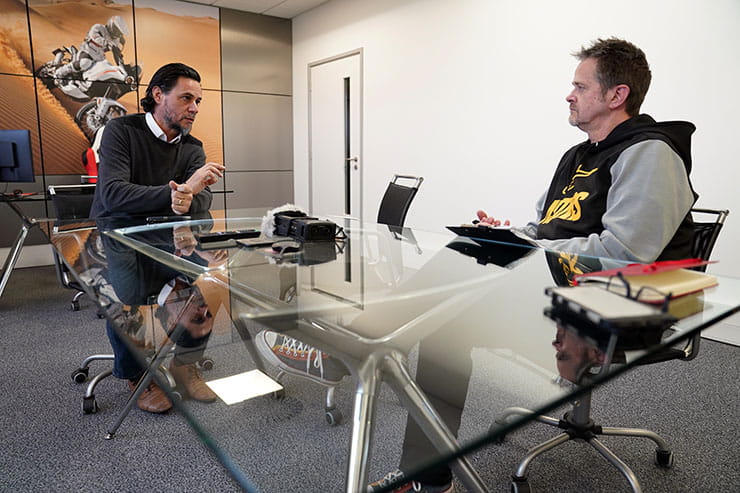
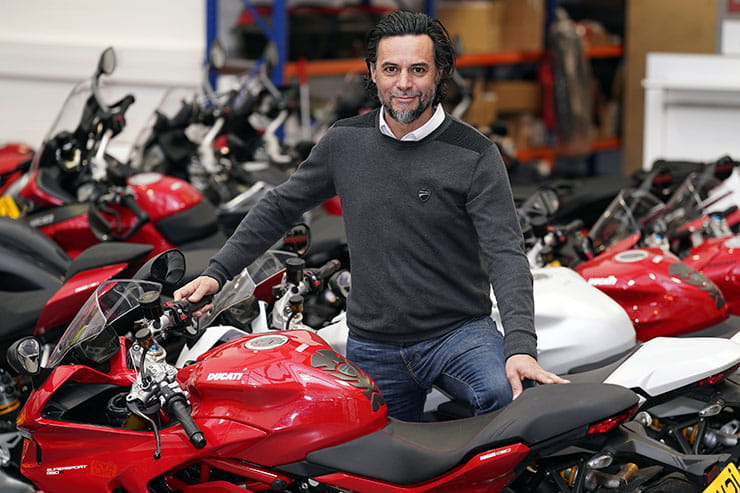
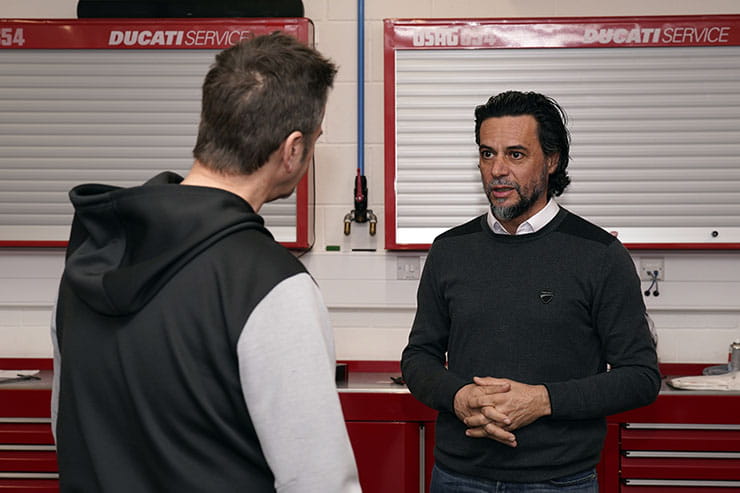



.ashx?h=493&w=740&la=en&hash=D755BD10E5FAFFCCE3D83563F194C336DCD0C655)
